
Rapala varuna, the indigo flash, is a species of lycaenid or blue butterfly found in the Indomalayan realm and the Australasian realm.

Baspa melampus, the Indian red flash is a species of blue (Lycaenidae) butterfly found in South-East Asia.

Rapala is a genus of butterflies in the tribe Deudorigini of the subfamily Theclinae of the family Lycaenidae. They are found throughout South Asia and Southeast Asia, with a few species extending to Australia and into the eastern Palaearctic region.

Rapala dieneces, the scarlet flash, is a species of lycaenid or blue butterfly first described by William Chapman Hewitson in 1878. It is found in Myanmar, northern India, Assam, Bengal, Malaya, Singapore, Sumatra, Borneo, Nias and the Philippines.
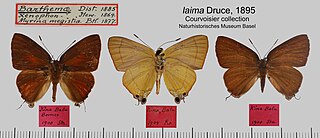
Rapala suffusa, the suffused flash, is a lycaenid or blue butterfly found in Myanmar, northern India, Assam, Thailand, Indochina and Palawan. The species was first described by Frederic Moore in 1878.
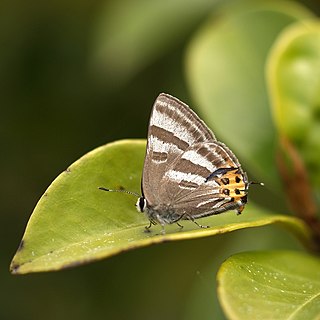
Rapala arata, the Japanese flash, is a butterfly of the family Lycaenidae. It is found from Russia, north-eastern China, Korea and Japan. The habitat consists of brook banks, meadows and the edges of montane mixed forests.

Rapala manea, slate flash, is a butterfly of the family Lycaenidae. It is found in most of the Indomalayan realm.

Rapala tomokoae is a butterfly of the family Lycaenidae first described by Hisakazu Hayashi, Heinz G. Schroeder and Colin G. Treadaway in 1978. It is endemic to the Philippines. Its forewing length is 17–19 mm.

Lepidoptera Indica was a 10 volume work on the butterflies of the Indian region that was begun in 1890 and completed in 1913. It was published by Lovell Reeve and Co. of London. It has been considered the magnum opus of its author, Frederic Moore, assistant curator at the museum of the East India Company. Frederic Moore described a number of new species through this publication. Moore was a splitter, known for careless creation of synonyms, sometimes placing the same species in more than one genus.

Rapala diopites is a species of butterfly of the family Lycaenidae. It is found on the Philippines.
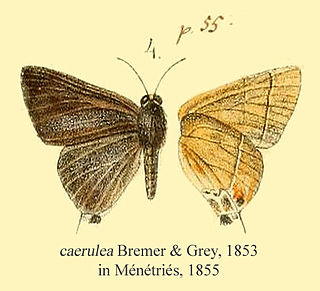
Rapala caerulea, the bush clover, is a butterfly of the family Lycaenidae. It was described by Otto Vasilievich Bremer and William Grey in 1851. It is found in north-eastern and central China, Taiwan, Korea and the Russian Far East.

Rapala domitia is a butterfly in the family Lycaenidae. It was described by William Chapman Hewitson in 1863. It is found in the Indomalayan realm.
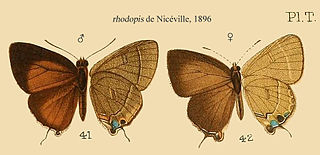
Rapala rhodopis is a butterfly in the family Lycaenidae. It was described by Lionel de Nicéville in 1889. It is found in the Indomalayan realm, where it has been recorded from Sumatra and Peninsular Malaysia.

Rapala rhoecus is a butterfly in the family Lycaenidae. It was described by Lionel de Nicéville in 1895. It is found in the Indomalayan realm.
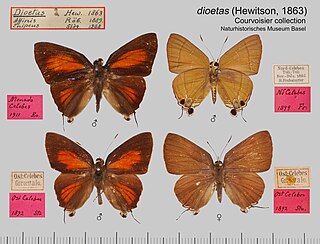
Rapala dioetas is a butterfly in the family Lycaenidae. It was observed by the British naturalist William Chapman Hewitson in 1863. It is endemic to Sulawesi.
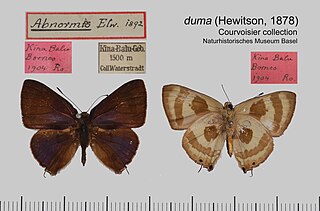
Rapala duma , or abnormal flash, is a butterfly in the family Lycaenidae. It was described by William Chapman Hewitson in 1878. It is found in the Indomalayan realm.
Rapala christopheri is a butterfly in the family Lycaenidae. It was described by David A. Lane and Chris J. Müller in 2006. It is endemic to East Timor.
















